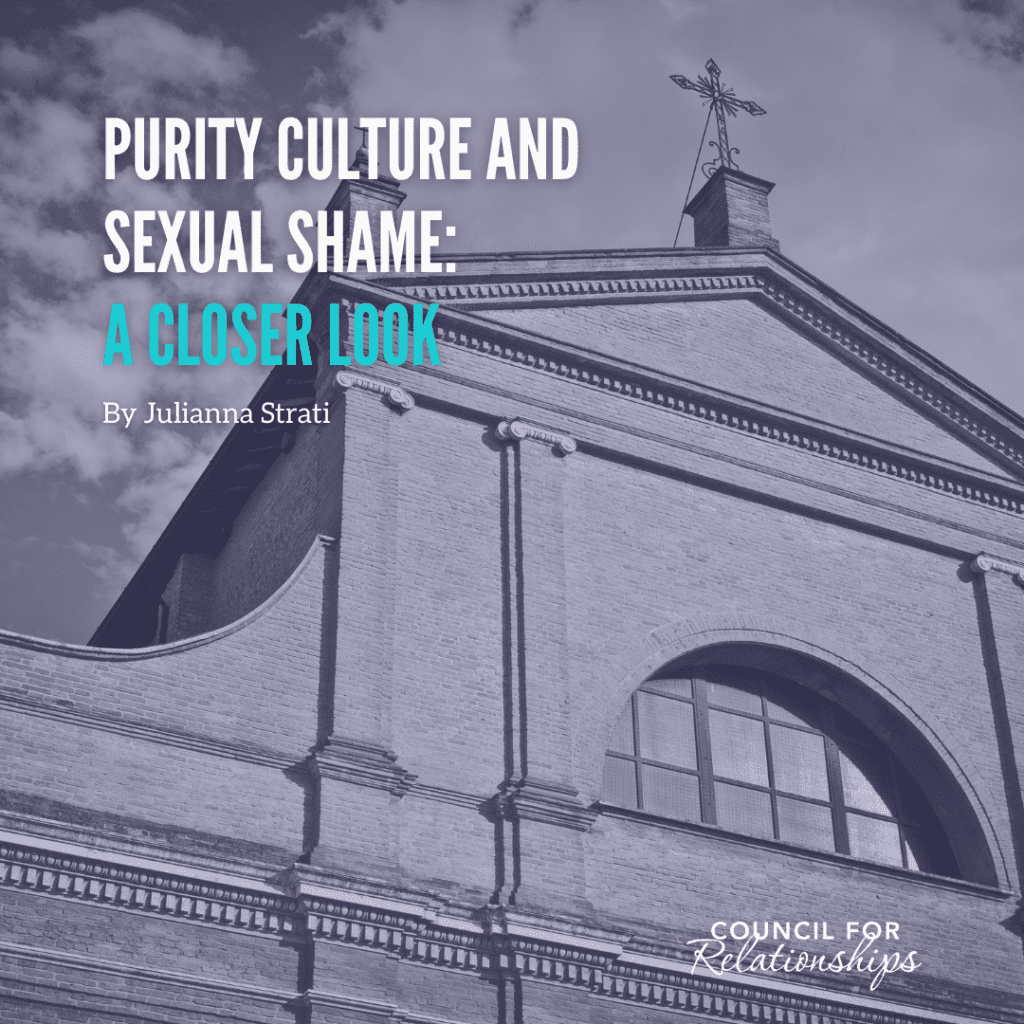Purity Culture and Sexual Shame: A Closer Look
Purity culture and sexual shame have shaped the lives of many people raised in Christian communities in the United States. These beliefs became popular in the 1990s. They often suggest that a person’s worth is tied to their sexual behavior, especially for women and LGBTQ+ individuals.
This focus on sexual purity affects how people see themselves, their sexual desires, and their sexual experiences. Even though some see these ideas as outdated, they still affect people today.
In this blog, we will look at where purity culture comes from, how it impacts sexual health, and the lasting shame it can cause.
What Is Purity Culture?
Purity culture and sexual shame came from Evangelical Christian teachings in the 1990s, mainly in the Midwest. “Evangelical” refers to a branch of Christianity that focuses on the Word of God and encourages a personal relationship with Jesus Christ.
Purity culture taught young people, especially young women, to avoid sexual “scandal.” Many people were told that their value was tied to their virginity. This pressured women to stay “pure” for their future husbands.
This idea spread through social media and popular culture in the early 2000s. Celebrities like Miley Cyrus, Selena Gomez, and Demi Lovato wore purity rings during their Disney Channel days to show their commitment to sexual purity. Even though people talk less about purity culture now, its teachings on sexual shame still affect many Christian groups in the United States.
How Religion Shapes Purity Culture and Sexual Shame
According to the Pew Research Center, about two-thirds of Americans still identify as Christians, but this number has been declining over the years.
In the early 1990s, about 90% of U.S. adults said they were Christian. By 2020, this number dropped to around 64%. During the same time, the number of people who don’t follow any religion, often called “nones,” grew from about 16% to nearly 30%.
These changes make us wonder why younger generations are abandoning traditional religions. One reason could be the strict views on sexual relationships in these groups, which often lead to sexual shame. Researchers Daniluk and Browne say that the Catholic Church’s focus on Mary’s virginity shows its struggle to accept female sexual pleasure.
Both Catholic and Evangelical Christian teachings share a common message: purity culture and sexual shame. These beliefs have a significant impact on men and women. They also tend to exclude LGBTQ+ individuals by judging their sexual relationships as wrong, which adds to feelings of shame and guilt.
The Long-Term Effects of Purity Culture and Sexual Shame
Research has shown that purity culture affects people’s mental health, especially women in Christian communities. A study discussed in an NCBI paper found that focusing on abstinence and virginity can lead to anxiety, guilt, and sexual problems. The pressure to meet these ideals causes stress and confusion about sexual identity and desires.
Many people raised in purity culture struggle with sexual shame and have trouble forming healthy sexual relationships. The study also said that it’s crucial to have open discussions about sexuality in these communities. This can reduce stigma and improve mental health.
The effects of purity culture have been apparent for a long time. In 1953, sexologist Alfred Kinsey found that Christian teachings made it harder for women to enjoy sexual pleasure. More recent research shows that people who are “very religious” often have lower sexual satisfaction, less sexual activity, and more sexual shame, especially women.
Researchers Dena Abbott, Jeff Harris, and Debra Mollen studied how religious commitment affects women’s sexual self-esteem. They found that more religious women often feel less confident about their sexual attractiveness. Catholic women, in particular, frequently have lower overall self-esteem. Even Christian women who feel okay with casual sex may feel conflicted because their sexual desires don’t match religious teachings, which leads to more sexual shame.
A study on Catholic women’s sexual attitudes found that women who left the Church, whether for another faith or no faith at all, often felt more sexual shame. This shows that it can be hard for people to move past religious teachings about sexuality, even after they leave the church. The effects of purity culture and sexual shame can last a long time and harm sexual health.
Marriage, Sexual Shame, and Gender Roles
Christian teachings often stress the importance of marriage and say that sex within marriage is free from shame, especially when it leads to having children. However, purity culture and sexual shame can cause feelings of moral failure and guilt that do not go away after a wedding.
Research by Amanda Ortiz and her team looked at married Christian women’s experiences with premarital and marital sex. They found that women often felt guilty during their first sexual experiences, whether before or after marriage. This suggests that sexual shame can stay with people, no matter their marital status. Also, these teachings often enforce gender roles that restrict how men and women express their sexual desires and experience sexual pleasure.
The Impact of Purity Culture and Sexual Shame on LGBTQ+ People
Purity culture and sexual shame have often excluded LGBTQ+ individuals. These teachings interpret biblical texts to condemn same-sex relationships and do not see non-traditional sexual relationships as valid.
As a result, many LGBTQ+ individuals feel deep shame and stigma. They often face self-judgment and poor mental health because they feel rejected by their faith communities. This rejection can lead to a loss of identity and belonging.
Research shows that highly religious people often feel more sexual shame if they are LGBTQ+. This shame can have lasting effects, harming not just individuals but also their sexual partners, sexual health, and overall well-being.
Moving Forward: Addressing Purity Culture and Sexual Shame in Therapy
While research on the link between religion, sexuality, and shame is still growing, current studies show a clear pattern: teachings that enforce strict sexual rules often lead to lasting sexual shame. As sex therapists, we must help clients understand these feelings, reduce sexual shame, and take control of their sexuality in healthy ways. Exploring one’s sexuality doesn’t have to feel wrong. It can be a positive and empowering journey.
Therapists play an essential role in helping clients see that they are more than their sexual history. Therapy offers a safe space to explore these feelings and start healing. By addressing purity culture and sexual shame, therapists can help clients regain confidence and build healthier, more fulfilling relationships.
Are you ready to help clients work through these challenges and guide them as they navigate the complex relationship between religion, sexuality, and shame? Together, we can create a more welcoming and understanding environment for all.
 About CFR Clinical Intern Julianna Strati
About CFR Clinical Intern Julianna Strati
Julianna Strati (she/her/hers) is a Clinical Intern in CFR’s Clinical Internship Program. This program includes our Postgraduate Certificate Program and several Master’s-Level academic programs in the Philadelphia area. It focuses on improving relationships through accessible and expert therapy for individuals, couples, and families while providing clinical training and research opportunities.
Visit our website to learn more about CFR’s Clinical Internship Program. If you have questions, contact Senior Director Allen-Michael Lewis at alewis@councilforrelationships.org.
If you are in Pennsylvania and looking for therapy but are concerned about the cost, our highly supervised Clinical Interns offer low-fee therapy services starting at $20. You can also request a therapy appointment with one of our 85 therapists.
If this is an emergency, please call 911 or contact the National Suicide Prevention Lifeline by dialing 988.
More Expert Voices: Mental Health Blogs from Council for Relationships
CFR’s therapists, psychiatrists, and mental health experts have much more to share! Check out the CFR Expert Voices blog for helpful advice on topics like purity culture and sexual shame, understanding family dynamics, using attachment theory in therapy, improving relationships, and more. Want to stay updated? Join our mailing list for access to our latest blogs and expert insights!
If you found this blog helpful, explore more great content on the CFR Expert Voices blog.

